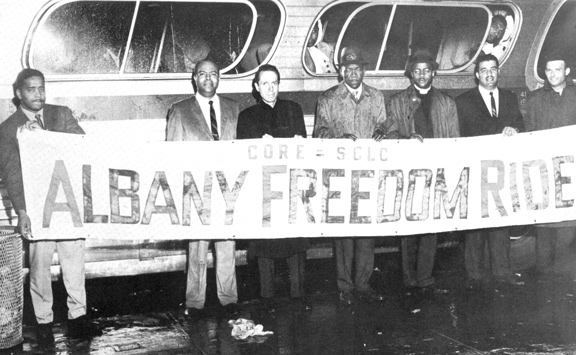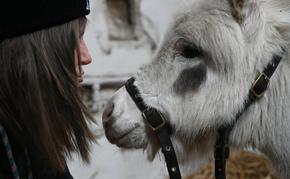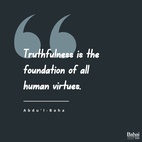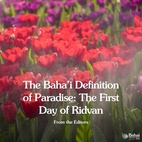The views expressed in our content reflect individual perspectives and do not represent the official views of the Baha'i Faith.
How far that little candle throws his beams! So shines a good deed in a weary world. – William Shakespeare, The Merchant of Venice
It is curious that physical courage should be so common in the world and moral courage so rare. –Mark Twain
Memories of our lives, of our works and our deeds will continue in others. – Rosa Parks
Exalt your thought. Reflect over all your affairs. Magnify your endeavours. Enlarge the circle of your ideals. Open the wings of spiritual wisdom. Let your hope be the accomplishment of most great deeds, the results of which may immortalize your names. – Abdu’l-Baha, Star of the West, Volume 5, p. 99.
Human virtue truly shows itself best in the face of tests and difficulties.
That’s why we love the stories and myths of heroes, who exemplify courageous action against great odds and enormous opposition. Fortitude, endurance and bravery always inspire us, calling us to the best qualities in ourselves. In J.R.R. Tolkien’s enormously popular Lord of the Rings legendarium, for example, we root passionately for the hobbits who insist on doing the right thing, with no possible reward and in the face of certain defeat. Tolkien, a veteran of the bloodiest battle in human history–the Somme Offensive in World War I, which wounded and killed one million people—certainly understood that kind of moral courage.
I learned in war that courage usually takes two forms—physical courage and moral courage.
Most of us will defend our lives if they’re threatened. Many of us would react strongly and immediately if someone we loved was at risk. Those kinds of physical courage—usually highly reactive, instinctive, immediate and spontaneous—win medals and commendations and public praise. Without thinking, someone jumps into a rushing river to save a drowning child, for example—that sort of physical bravery, where we altruistically risk our own life to save someone else’s, typically happens with no time to reflect. The people who attempt these feats of physical courage often say later “I’m no hero—I just followed my instincts.” That’s not just modesty—it’s usually true.
The other kind of bravery requires lots of advance thinking and contemplative time; can’t be only a reflex action; and in many ways qualifies as even more courageous. Moral courage–defined as the courage to take action for inner ethical and spiritual reasons—requires careful forethought. It involves putting your well-being, your safety and even your life at risk for a higher cause or a principle.
Contemporary philosophers say that moral courage, the most exemplary modern form of the virtue, demands even deeper fortitude and resolve than any other variety. Commonly known as “the courage of your convictions,” moral courage asks us to value our most deeply-held beliefs more than anything else.
Can you think of any examples?
Here’s one: the civil rights-era Freedom Riders, the interracial group of college students who intentionally put themselves in harm’s way to non-violently demonstrate for justice and racial equality.
 Here’s another one: the educational advocacy of Malala Yousefzai, the teenage girl who braved death threats and an actual assassination attempt to ensure that girls could go to school in Afghanistan.
Here’s another one: the educational advocacy of Malala Yousefzai, the teenage girl who braved death threats and an actual assassination attempt to ensure that girls could go to school in Afghanistan.
Here’s one more, or actually a few hundred thousand more: the enormous bravery and moral courage of the Baha’is in modern-day Iran, who risk torture, imprisonment and execution for their Baha’i beliefs in peace, unity and oneness.
Moral courage requires many virtues beyond simple bravery. It asks us to more dearly value a noble principle than our own concerns; to sacrifice our energies, our resources and our lives for something greater than ourselves. It calls for patience, fortitude, boldness, strength, conviction, grit, tenacity and faith in the future. The Baha’i teachings say that, above all, moral courage calls for action:
Let your acts be a guide unto all mankind, for the professions of most men, be they high or low, differ from their conduct. It is through your deeds that ye can distinguish yourselves from others. Through them the brightness of your light can be shed upon the whole earth. – Baha’u’llah, Gleanings from the Writings of Baha’u’llah, p. 305.
O son of my handmaid! Guidance hath ever been given by words, and now it is given by deeds. Every one must show forth deeds that are pure and holy, for words are the property of all alike, whereas such deeds as these belong only to Our loved ones. Strive then with heart and soul to distinguish yourselves by your deeds. In this wise We counsel you in this holy and resplendent tablet. – Baha’u’llah, The Hidden Words, pp. 48-49.
O people! Words must be supported by deeds, for deeds are the true test of words. Without the former, the latter can never quench the thirst of the yearning soul, nor unlock the portals of vision before the eyes of the blind.
The day of deeds hath come: Now is not the time for words. The Messenger of God hath appeared: Now is not the hour for hesitation. Open thou thine inner eye that thou mayest behold the face of the Beloved, and hearken thou with thine inner ear that thou mayest hear the sweet murmur of His celestial voice. – Baha’u’llah, The Tabernacle of Unity
That individual, however, who puts his faith in God and believes in the words of God — because he is promised and certain of a plentiful reward in the next life, and because worldly benefits as compared to the abiding joy and glory of future planes of existence are nothing to him – will for the sake of God abandon his own peace and profit and will freely consecrate his heart and soul to the common good. – Abdu’l-Baha, The Secret of Divine Civilization, p. 96.

















Comments
Sign in or create an account
Continue with Facebookor